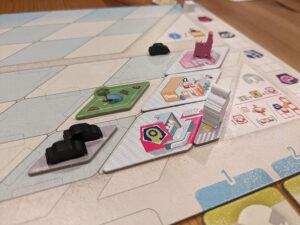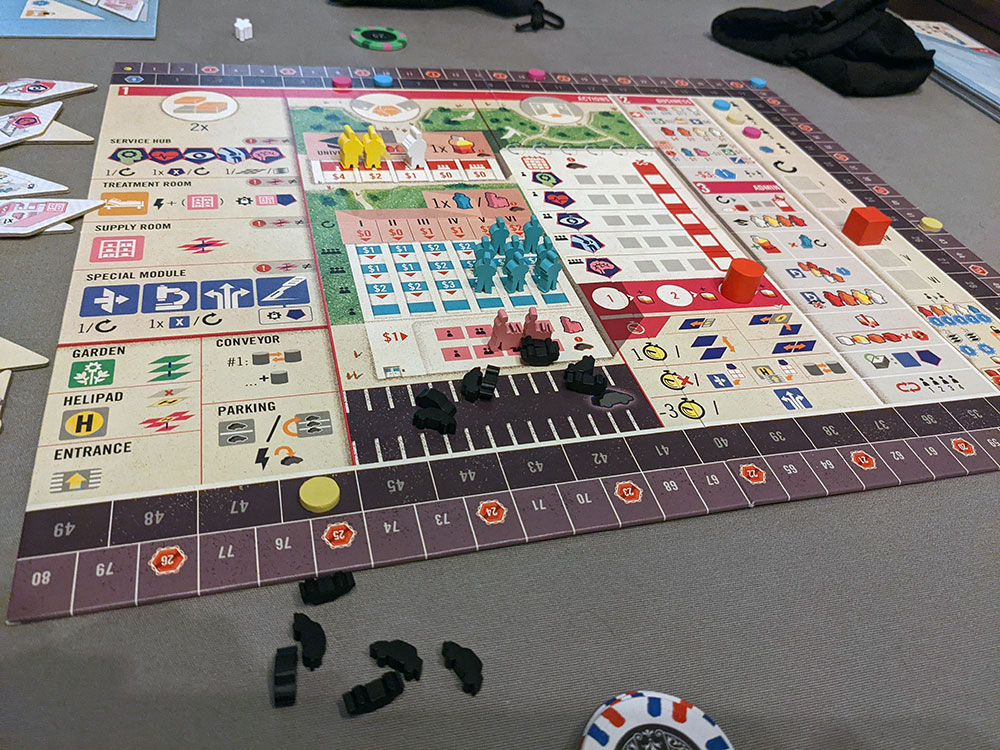 Dig if you will the picture of you and I buried in expansions. The weight of modules cover us. Can you my darling? Can you picture this?
Dig if you will the picture of you and I buried in expansions. The weight of modules cover us. Can you my darling? Can you picture this?
Ok, enough Purple Rain, it’s time for Meeple Pain. That’s right, we’re talking about treating patients (and testing patience) in the Deluxe Edition of Clinic, a reimplementation of the 2014 cult Euro classic from Alban Viard, released by Capstone Games. Not only are we talking about the base game, but we will, in a very roundabout fashion, talk about the numerous expansions (“extensions,” they call them) that were released in quick succession, and (to be absolutely clear), I DID NOT PLAY. We’ll briefly examine what purpose they serve, and who they are actually for. Hell, it could be a broader conversation about expansions in general. Let’s put the whole practice on trial, shall we? OK, here we go, Clinic: Deluxe Edition, a 1-4 player that BGG claims to take 60–150 Min (lol).
Gameplay Overview:
Oddly, for a game that easily takes 1 hour to teach, the game is not hard to conceptually explain. Each player selects one of three possible actions to take and in player order, those actions are executed.

The first is building additions to your clinic, the second is hiring doctors, nurses, and orderlies, and the third is intaking potential patients (cubes whose condition is represented by their color; white = not severe, red = almost dead). This is done three times each round, with each type of action only allowed to be taken a maximum of twice per round per player.
After that, there’s a movement phase where patients and newly hired employees move around within your clinic to get where they need to go—treatment rooms, labs, supply closets, etc…—which costs TIME, a negative currency that will subtract from your final score at the end of the game (because, as they point out in the rulebook, time is money). Patients that can be treated by a doctor—or combination of doctor & nurse—are then treated, and you are paid cold hard cash, baby (because let’s face it, life is hell and healthcare ain’t free in the world of Clinic). Those patients get discharged, you have to pay your expenses (your staff + your facilities), and you may then spend any leftover money to buy popularity (see above about this life being hell).
After this is the admin phase: untreated patients’ conditions worsen, doctors get dumber, or I guess more exhausted, and the board resets for the next round. After 6 rounds, the player with the most popularity wins. This is a combination of the popularity bought over the course of the game, how many buildings one has, doctors and nurses, minus time spent and untreated patients. That’s it! On its face, this reads like the structure of countless Euro games. But WHY does this game definitely take every minute of one hour to teach? Well, let’s discuss.

Game Experience:
Ok, let me actually get this out of the way: I LIKE this game. I like it a lot, actually. Clinic: Deluxe Edition is a very good game, and I would recommend it! How’s that for a Shut Up & Sit Down-style mid-review turn? But before we get into what I like, let’s get into some of the obvious flaws of this game.
1) The teach time. This is an absolute BEAST to teach. To the point where I really have to consider if I want to teach it again. The part that eats up the most time is the build action. The element I glossed over in the Gameplay Overview is the fact that building out your clinic is a three-dimensional spatial puzzle of vexing precision. While all tiles have the prerequisite restriction that they cannot be adjacent to a tile of the same color, all the tiles have their own specific placement parameters. Treatment Rooms must be next to Service Hubs on the same floor, while Supply Rooms must be adjacent to Treatment Rooms, but can be a floor above it. That’s right, multiple floors. Service Hubs cannot be on the same floor of the same building as another Service Hub. Helipads may not have something built on top of them (ok, that one is pretty intuitive).

Also, did I mention that every patient, doctor, nurse, and orderly drives? In this dystopian world with no universal healthcare, there is also no public transit, so you must build parking lots to accommodate everyone’s vehicles. The picture quickly becomes nightmarish, as every street and lot is loaded with gas-guzzlers. So, while you may want to build a much needed operating room right there, sorry, that’s designated parking. If you’ve ever been to a community meeting discussing a potential new building development, you know how people feel about their parking!
Once building is explained, the rest of Clinic really does flow fairly well, and surprisingly isn’t a terribly “analysis paralysis”-prone game. There’s very little downtime in the game, as everyone is basically executing the movement and treatment phases simultaneously. The game can be fairly unforgiving—not quite Splotter, but with some similar vibes. If you screw up your plan and realize you’re unable to treat anyone in a particular round, it can really sour your game, but hey, them’s the breaks!

Ok, the Extensions. Let’s get this out of the way. I was sent the base game (which already comes with five included modules that you can add) and FIVE (5), count them FIVE expansion boxes called Extensions, as well as 3 smaller expansions. Each full Extension box adds around a dozen new modules: ambulances, hospice, janitors, intensive care units, just to name a few in the FIRST Extension. With a game that takes an hour to teach, is a meaty game to begin with, and comes with 5 included modules, I suddenly realized what a conundrum I had found myself in. What did I sign myself up for!? The 5 included modules are already, in my humble opinion, largely extraneous and don’t really add that much to the game. It would take any reasonably experienced gamer at least a dozen plays to feel like they have fully grocked the deeper machinations of the base game and the included modules. AT LEAST.

Needless to say, I did not play the Extensions (Capstone apologies, and holler at your boy if you want ‘em back). This is absolute expansion overload, and I think we need to take this opportunity to look at this broader problem in games. I came across a similar problem recently when playing the game Red Cathedral, an absolutely wonderful, perfectly balanced little Eurogame from Devir. At this year’s Gen Con, Devir introduced an expansion to the game that, despite my skepticism of expansions, I was excited to try. As usual, after purchasing and actually bringing it to the table, I found that it took a perfectly balanced and enjoyable game and forcefully mashed another concept into it that, by and large, didn’t improve the game, and just served to complicate things unnecessarily.
And that was for a game that takes 20 minutes to teach and an hour to play. Just to remind you, in case you forgot, Clinic takes an hour to teach. And, at minimum, 2 hours to play. And it’s a deep, deep game, one that will definitely take many plays to master. So, then the question arises, WHO ARE THESE EXTENSIONS FOR? They are for people who have played this game 20 times and need to refresh their experience. Honestly, introducing them prior to at least 10 plays seems utterly insane to me. So, I tap out on the Expansions, and I can almost certainly tell you without even playing them, you don’t need them. At least not for like, oh, 5 years.
Final Thoughts:

I really liked Clinic Deluxe Edition! It’s a really meaty Euro and offers a refreshingly cynical look at our absurd for-profit healthcare system. Fans of Splotter games who appreciate really challenging puzzles will especially dig it, as it is quite a heavy game (BGG has it at 4.06/5 and honestly, that’s about right). If Clinic Deluxe Edition becomes your gaming group’s favorite game, and you play it every other week for a year, then maybe get the First Extension. Otherwise, buy the base game and enjoy it. There’s a lot to dissect in there and you don’t need to go to medical school to diagnose it.
Final Score: 4 Stars – A beast of a teach, but a rewarding heavy Euro with action selection, a spatial puzzle, and a tight economy, all while skewering the healthcare industry. Not for casual gamers! And don’t worry about the Extensions, you don’t need ‘em!
 Hits:
Hits:
• Solving the spatial puzzle
• Treating patients is a reward in and of itself
• Funny/depressing theme
Misses:
• The most egregious expansion glut I have ever seen
• The teach! There’s got to be a better way!
• Set-up is tough, wish there was an insert that helped
Source: Board Game Quest





